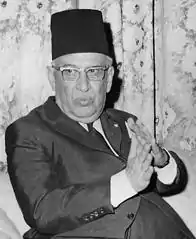Hussein Al Oweini
Hussein Al Oweini (Arabic: حسين العويني; 24 December 1900 – 11 January 1971)[1][2] was a Lebanese businessman and politician who served as Prime Minister of Lebanon twice. He also held other cabinet positions.
Hussein Al Oweini | |
|---|---|
 | |
| Prime Minister of Lebanon | |
| In office 20 February 1964 – 25 July 1965 | |
| President | Charles Helou |
| Preceded by | Rashid Karami |
| Succeeded by | Rashid Karami |
| Interim Prime Minister of Lebanon | |
| In office 14 February 1951 – 7 April 1951 | |
| President | Bechara El Khoury |
| Preceded by | Riad Al Solh |
| Succeeded by | Abdullah Arif Yafi |
| Personal details | |
| Born | 24 December 1900 Beirut, Ottoman Empire |
| Died | 11 January 1971 (aged 70) Beirut, Lebanon |
Career
Oweini went to Saudi Arabia and worked as a business agent for the House of Saud from 1923 to 1947.[5] He also founded a company, Ne'ma Te'ma, in Riyadh.[6] He was the Minister of Finance from July 1948 to June 1951.[7] He was first appointed interim prime minister on 14 February 1951 under president Bechara El Khoury[4][8] succeeding Riad Al Solh. He was in office until 7 April 1951 and succeeded by Abdullah Arif Yafi.[3] On 27 September 1957, Oweini and two other former prime ministers, Saeb Salam and Abdallah El-Yafi, were arrested on charges of planning an armed coup and riots during the elections held in May.[9]
Oweini's second term as prime minister was from 20 February 1964 to 25 July 1965 under president Charles Helou.[10][11] Both his predecessor and successor was Rashid Karami as prime minister.[3] Oweini was the leader of the National Front.[12] He also served as Minister of Foreign Affairs and Emigrants for three separate terms, from 1958 to 1960, in 1965, and 1968 to 1969.[13] During his third term as foreign minister, Oweini also acted as Minister of National Defense.[14]
Death
Oweini died on 11 January 1971, aged 70.[1] After his death, the Hussein Al Oweini Award was named in his honor.[15]
References
- MEED. Economic East Economic Digest, Limited. 1971. p. 75.
- "آل عويني". Islam Guiden.
- "Rulers of Lebanon". Jewish Library. Retrieved 8 April 2013.
- R. Hrair Dekmejian (1975). Patterns of Political Leadership: Egypt, Israel, Lebanon. SUNY Press. p. 33. ISBN 978-0-87395-291-0.
- Mehio, Saad (9 July 2002). "Prime Minister Alwaleed bin Talal? For what?". The Daily Star. Retrieved 18 July 2013.
- "Riyadh's guest". Ain Al Yaqeen. 21 April 2000. Archived from the original on 28 June 2013. Retrieved 8 April 2013.
- "Former Ministers". web.archive.org. 18 December 2019.
- Mroueh, Wassim (14 June 2011). "Looking back on almost 7 decades of Cabinet crises". The Daily Star. Beirut. Retrieved 8 April 2013.
- Samir Khalaf (2002). Civil and Uncivil Violence in Lebanon: A History of the Internationalization of Communal Contact. Columbia University Press. p. 111. ISBN 978-0-231-50536-9.
- George W. Cornell (2 December 1964). "Welcome Pope". The Evening News. Bombay. AP. Retrieved 8 April 2013.
- "Bridge stamps of Lebanon". Bridge Guys. Retrieved 8 April 2013.
- Wilton Wynn (22 July 1958). "Lebanon leader predicts US troop removal". Ellensburg Daily Record. Beirut. AP. Retrieved 8 April 2013.
- "Foreign ministers". Rulers. Retrieved 8 April 2013.
- "New peace plan for Middle East offered". The Dispatch. UPI. 2 January 1969. Retrieved 8 April 2013.
- "Zahraa Shaito". American University of Beirut. Retrieved 18 July 2013.
| Political offices | ||
|---|---|---|
| Preceded by Riad Solh |
Prime Minister of Lebanon 1951 |
Succeeded by Abdallah El-Yafi |
| Preceded by Rashid Karami |
Prime Minister of Lebanon 1964–1965 |
Succeeded by Rashid Karami |